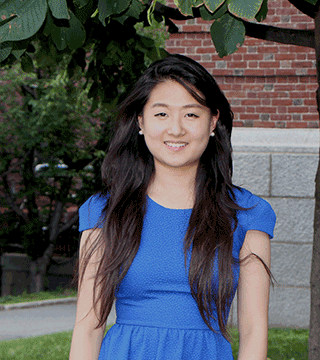Student by day, Executive Director by night, neuroscience concentrator Yi Zhang, class of 2017, moonlights as the mastermind behind SciNote, a science blog and non-profit education organization that seeks to demystify and democratize contemporary science—from the basics (Why do the seasons change? What is a rainbow?) to the latest breakthroughs in cutting-edge research.
“I’ve always been passionate about science communication,” says Zhang. “My parents come from China and grew up farming,” she explains; they didn’t have the kind of educational opportunities she enjoyed growing up in Carlisle, Massachusetts, and “my mom has maybe a high-school-level science education.” Throughout her childhood, discussing her favorite subject with her family meant engaging in inter-generational, cross-cultural scientific dialogue in her own living room. These exchanges, equally challenging and rewarding, inspired her to advocate STEM (Science/Technology/Engineering/Math) education and scientific discussion that is both accessible and engaging for intellects of all cultural and academic backgrounds.
Zhang honed her blogging skills in high school, as an antidote to afterschool boredom, and continued to post her philosophical musings as she embarked on a neuroscience concentration here at Harvard. Harnessing her own experience and an ever-expanding virtual community of curious and open-minded science geeks, Zhang launched SciNote last summer with a simple premise: we are all scientists when we ask questions and seek answers.
“One of the things I appreciate most about SciNote,” Zhang reflects, “is that it includes people of all different scientific and educational backgrounds. We have a staff of about 40 volunteers who write posts for SciNote. We have a few high school students, some college students, some postdocs, science teachers, and people who are not even working in science but are just interested in certain subjects. Same thing goes for our readers—it’s very diverse.”
SciNote posts emphasize everyday science and strive to contextualize the latest in-the-news-research without the sensationalism of results-focused science media. Articles compiled by SciNote “discoverers” explain recent findings by establishing the background of the research, inviting readers “into the scientist’s shoes,” as Zhang puts it: “We look at where the gaps in science were before the discovery and how this discovery fills that gap.”
SciNote’s interactive “ask box” feature invites readers to “ask us anything,” from the mundane to the obscure. These questions serve as a springboard for “Seeking SciNote” posts, in which SciNote experts explain and explore readers’ queries as well as offer suggestions for further reading and resources.
Zhang’s crack team of co-directors includes two Harvard undergraduates, Kaan Yay and Jay Qu (both physics concentrators), and Tynan Phillips, a tumblogger studying environmental chemistry at Thompson Rivers University in British Columbia, Canada. With readership on the rise (SciNote has over 10,000 readers on Tumblr alone), SciNote’s executive team is pursuing both corporate sponsorship and crowdfunding to subsidize outreach efforts and an annual magazine, which will showcase and expand upon the past year’s top articles. Between classes, labs, and homework sprints, Zhang and her colleagues are assembling a series of “SciKits” to ship to SciNote’s international partner schools, such as Our Lady of the Angels secondary school in Kigali, Rwanda. These lab-in-a-box kits include a do-it-yourself hand-warmer that challenges students to explore exo-thermic reactions and a set of optics experiments that use polarizers to look at light.
With these projects well underway, Zhang’s ambitions for SciNote continue to expand. She envisions other social and information media platforms, afterschool programs, and additional school partnerships. In the meantime, feedback is strong and encouraging. A recent article on the merits of vaccination and the science behind the controversy inspired a few heated comments, which Zhang interprets as a sign she’s on the right track: “For me it was an indicator of the audience that we’re reaching. Even if they’re outraged, if it can bring the issue to their attention and maybe offer some facts, I think it’s worthwhile.”


